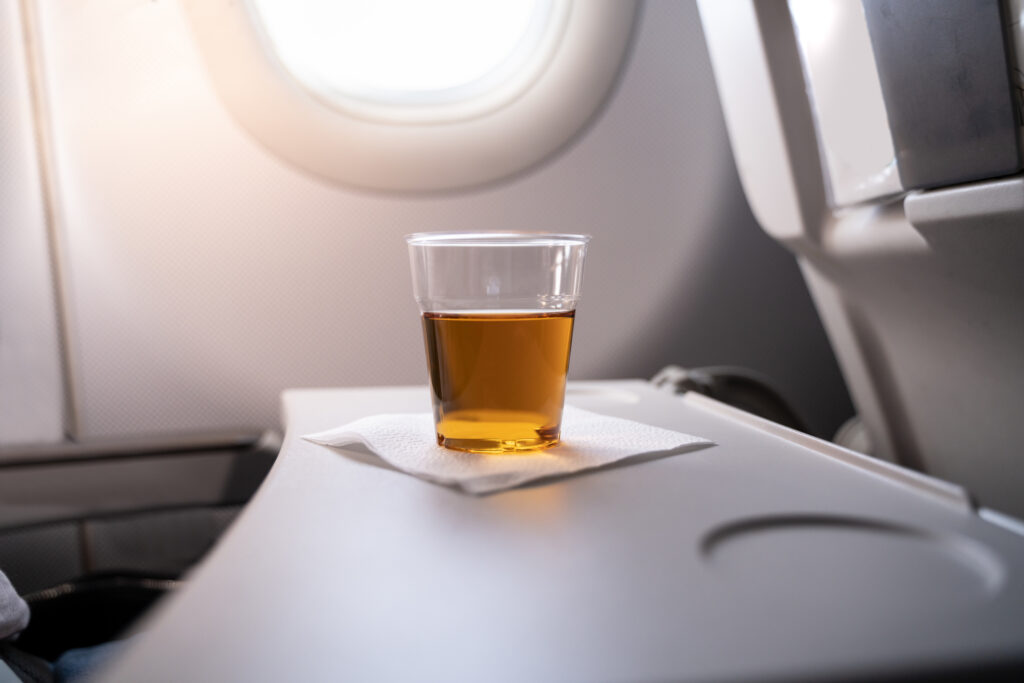Advertiser & Editorial Disclosure: The Bulkhead Seat earns an affiliate commission for anyone approved through the links below. This compensation may impact how and where links appear on this site. We work to provide the best publicly available offers to our readers. We frequently update them, but this site does not include all available offers. Opinions, reviews, analyses & recommendations are the author’s alone, and have not been reviewed, endorsed, or approved by any of these entities.
You’re on vacation. It’s time to relax and have some fun. As you settle into your seat (in a premium cabin) and prepare for takeoff, the flight attendant’s familiar question arises: “Would you like something to drink?” For most, that means it’s time to celebrate with a mimosa, a Bloody Mary, or another cocktail, but for some one drink is not enough. Two, three, four, or more drinks aren’t either. These folks take it to another level and this is where the craziness begins. This begs the question, should alcohol be served in flight at all?
Thinking about letting loose? Please remember this rule. @FAANews regulations prohibit travelers from drinking any #booze on a flight, unless served by a flight attendant. Here's what will happen to unruly passengers: https://t.co/sYK1TNpBiF pic.twitter.com/BwbJ5XgWmG
— TSA (@TSA) May 25, 2023
Safety & Security
The primary concern of those in favor of an alcohol ban on planes revolves around safety. Air travel already demands vigilance due to its unique environment and the effects of alcohol can exacerbate any potential risks. Alcohol impairs judgment, coordination, and cognitive functions, leading to an increased likelihood unruly behavior. A quick search will show just how many fights have broken out in flight after passengers had one too many.
An inebriated male passenger urinated on a female co-passenger in Air India's business class on Nov 26, 2022
Air India has lodged a police complaint regarding the incident which took place on Nov 26 when the flight was on its way from JFK (US) to Delhi: Air India official to ANI pic.twitter.com/XE55X6ao0b
— ANI (@ANI) January 4, 2023
American Airlines first class passenger dragged off a flight after becoming aggressive when flight attendants refused his demand for a pre-departure beverage. pic.twitter.com/1DX9U5hBm5
— Breaking Aviation News & Videos (@aviationbrk) April 7, 2023
Passenger Well-Being
Alcohol consumption on planes has resulted in disruptive and offensive behavior, causing inconvenience and distress for fellow travelers. This has ranged from passengers getting loud to physical altercations and even several instances of travelers being urinated on while flying. Opponents of a ban argue that personal responsibility should be the focus, rather than outright prohibition. By enforcing strict policies and penalties for unruly behavior, airlines can discourage inappropriate conduct while still allowing responsible passengers to enjoy alcoholic beverages. Increased training for flight attendants to identify and address issues related to alcohol consumption could be an alternative approach.

Health Concerns
In addition to the increased likelihood of passengers fighting, the dry air and reduced oxygen levels in the cabin can lead to dehydration and exacerbate the effects of alcohol on the body. Consuming alcoholic beverages while flying may contribute to increased fatigue, discomfort, and even jet lag. Whether to consume alcoholic beverages or not is a personal choice, but the health impact hits greater in the air.
Should Alcohol Be Banned?
The question of whether alcohol should be banned from airplanes is complex. While an alcohol ban could potentially enhance safety, improve passenger well-being, and address health and safety concerns, it may also impact passenger satisfaction and airline revenue. Striking the right balance between personal freedoms and ensuring a safe and enjoyable flight experience is crucial.
Perhaps a more prudent approach would involve implementing stricter regulations, improved training, and enforcing penalties for disruptive behavior caused by alcohol consumption. By targeting the root causes of incidents rather than imposing a blanket ban, airlines can mitigate risks while still accommodating the preferences of responsible passengers.
Ultimately, the decision to ban alcohol on airplanes should involve a collaborative effort between airlines, regulators, and passengers, weighing the interests of safety, security, and customer satisfaction. It is essential to find a balanced solution that allows everyone to travel comfortably while minimizing potential risks and disruptions.
Anthony’s Take: It’s nice to have a glass of wine on a plane, but it’s also not a frat party. Personal consumption is an individual choice, but flight attendants should be ready to cut passengers off and those passengers should understand there are consequences if their behavior spirals out of control.
User Generated Content Disclosure: The Bulkhead Seat encourages constructive discussions, comments, and questions. Responses are not provided by or commissioned by any bank advertisers. These responses have not been reviewed, approved, or endorsed by the bank advertiser. It is not the responsibility of the bank advertiser to respond to comments.
Advertiser & Editorial Disclosure: The Bulkhead Seat earns an affiliate commission for anyone approved through the links above This compensation may impact how and where links appear on this site. We work to provide the best publicly available offers to our readers. We frequently update them, but this site does not include all available offers. Opinions, reviews, analyses & recommendations are the author’s alone, and have not been reviewed, endorsed, or approved by any of these entities.
